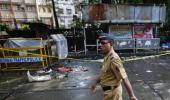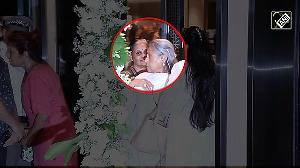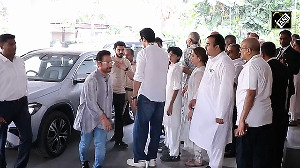
Given the nature of his job, a terrorist heading an underground organisation usually grooms a successor who is prepared to take over in case of his boss's arrest or death, says Rediff.com's Vicky Nanjappa.
Indian security agencies are celebrating the fact that four leaders of the dreaded terror outfit Indian Mujahideen have been arrested in the last eight months.
But the celebrations may be premature.
The Indian Mujahideen's short but dangerous history reveals that the IM bounces back after each setback, and does so with a more sinister terrorist at its helm.
IM first reared its ugly head on March 7, 2006, by carrying out an attack in Varanasi.
It was unknown at the time and the Students Islamic Movement of India was blamed for the serial blasts that killed 28 people.
On November 23, 2007, six blasts in Uttar Pradesh killed 26 people in Lucknow, Varanasi and Faizabad. This time too, the investigators suspected SIMI before the IM surfaced to take responsibility for the attack.
The group made it clear that its single point agenda was to target the Indian establishment because, IM operatives claimed, they wanted to avenge the many Muslims languishing in prison because of inadequate legal representation.
The IM audaciously announced its next terror strike -- in Ahmedabad on July 26, 2008 -- minutes before the attack occurred.
Fifty-six lives were lost.
Men like Riyaz Bhatkal, Abdus Subhan, Mansoor Peerbhoy and Iqbal Bhatkal led the IM.
Once the security agencies started hunting for them, Subhan and the Bhatkal brothers fled to Pakistan. Peerbhoy was arrested in Pune.
Yasin Bhatkal, who was waiting in the wings to take over, transformed the IM into a deadlier force.
He first built a core team comprising only four terrorists and then laid down some ground rules: Communicate directly; show no bravado through mails claiming responsibility for the attacks; strike big.
Between 2009 and 2013, he planned and carried out terror strikes in Bangalore, Mumbai, Delhi and Hyderabad.
After Yasin Bhatkal and his accomplice Assadullah Akthar were arrested in August 2013, security agencies wondered if the IM would stay afloat.
Tehsin Akhtar, who had helped Yasin Bhatkal carry out the IM's worst terror strikes, soon took over.
The Bihar-based Akhtar orchestrated the blasts at Bodh Gaya and Patna last year.
He was arrested recently by security agencies -- the exact date of his arrest has not been revealed -- but the IM will no doubt find a diabolic replacement soon.
Given the nature of his job, a terrorist heading an underground organisation usually grooms a successor who is prepared to take over in case of his boss's arrest or death.
Some of the men who can succeed Tehsin Akhtar:
Riyaz Bhatkal: The IM's founder is currently in Pakistan, but supervises every operation. He is in touch with IM members and is aware of their strengths and weaknesses.
Iqbal Bhatkal: Riyaz Bhatkal's brother, who is also in Pakistan, plans the travel arrangements of IM operatives.
Ariz Khan: He goes by the alias Junaid and hails from Azamgarh in Uttar Pradesh.
Mudassir: An expert bomb-maker, he is currently in Lahore.
Mirza Beg: A key operative who has gone off the radar since the German Bakery blasts.
Dr Shahnawaz Alam: A capable operative currently in Saudi Arabia, he has been part of the IM since the time Riyaz Bhatkal headed it.
Bada Sajid: He has worked with Yasin Bhatkal and Tehsin Akhtar while setting up the Bihar module. He is somewhere in India, according to intelligence agencies.
Afridi Alamzeb: He heads the Gujarat module.
Bagga: An accused in the Delhi serial blasts, he is in Pakistan.
Abu Rashid: Another member of the Gujarat module.
Sultan: The key recruiter for the IM is currently in Lahore.
Mohsin Chaudhary: He headed the Maharashtra module, and is believed to be leader material.
Amir Reza Khan: A founder-member, he is involved with every IM activity.
Bigdu Khan: Close to Yasin Bhatkal, he has been part of IM's second rung and is currently in Pakistan.
Image: Family members of Ahmedabad blast victims pay tribute during a prayer ceremony. Photograph: Reuters










 © 2025
© 2025